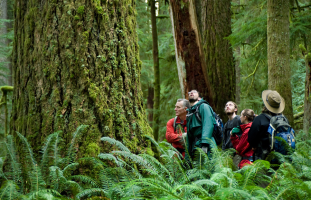On January 9, 2020, the White House Council on Environmental Quality (CEQ) released its blueprint to dismantle longstanding bedrock protections for communities, public lands, and wildlife. Designed to weaken the role of the public in service of extractive interests such as oil and gas companies, CEQ’s proposed rule is intended to empower federal agencies to advance the Trump administration’s reckless agenda against public lands and the climate.
COMMENT HERE BY MARCH 10 AND URGE THE REJECTION OF THE PROPOSED CHANGES! * The comment period for this is now closed *
The administration is expected to gut the 50-year-old National Environmental Policy Act (NEPA) by making more projects exempt from the environmental review it requires, and by stripping requirements for federal agencies to consider “cumulative” impacts such as contributions to climate change. By mandating risk evaluation to the environment and human health and allowing public review and participation, NEPA is one of our strongest tools for intervening against projects that destroy forests, ruin drinking water for our communities, and imperil endangered species. Despite the fact that 95% of federal projects are exempted from this law and review, the White House is proposing to increase the projects exempted (specifically including pipelines like the Jordan Cove LNG Project) in order to further gut environmental protections in this country.
The proposed rule is riddled with vague, banal language, and the devil is truly in the details. The full proposed changes can be found here, but in summary, CEQ’s proposed rule, if finalized, would:
- Weaken the obligation for federal agencies to constructively use the NEPA process to protect, restore, and enhance the environment. This would embolden radical political agendas supported by extractive interests, such as fossil fuel companies.
- Attempt to avoid the federal government’s duty to take responsibility for the indirect or “downstream” effects of its actions, such as the effects to the environment and public health of burning coal, oil, and dirty natural gas extracted from federal public lands.
- Eliminate the duty of federal agencies to consider the cumulative impacts of their actions. Under the proposed rule, a federal agency could, for example, approve a new coal, oil, or natural gas extraction project without accounting for the climate or public health impacts of the project when combined with other existing or reasonably foreseeable fossil fuel projects approved by that agency.
- Weaken the responsibility of federal agencies to provide a clear basis for choice by the agency and the public by rigorously and objectively considering reasonable alternatives, in particular those alternatives proposed by the public.
-

Devil’s Staircase Wilderness, Oregon Coast Range (photo by Tim Giraudier) Chill the ability of the public to hold agencies accountable to the law by requiring the public to post a monetary bond prior to seeking administrative review.
- Allow federal agencies to decline to undertake environmental analysis if the agency believes that analysis conflicts with other laws. For example, the timber industry in the Pacific Northwest has long (and wrongly) argued that NEPA and other laws like the Endangered Species Act do not apply to the Oregon & California lands in southwest Oregon because of those lands’ unique multiple use statutory direction.
- Allow project backers to undertake environmental analysis of the proposed project even if there is a conflict of interest between the project proponent and protection of the environment.
- Provide virtually unbridled authority to federal agencies to determine whether impacts are sufficiently significant enough to warrant an environmental impact statement. Existing regulations include specific criteria that must be used in making this determination, including where a proposed action involves highly controversial, highly uncertain, or unknown risks or would risk significant impacts to unique resources such as Wild and Scenic Rivers or Wilderness Areas.
Cascadia Wildlands and our conservation allies will be pushing back against these proposed changes legally and otherwise, but it is important that the Trump administration is shown the level and degree of public support for federal environmental protections that have long safeguarded our treasured wild places. Your voice is needed!
Comments can be submitted via the federal government’s online portal here or mailed to:
Ms. Mary Neumayr
Chair
Council on Environmental Quality
730 Jackson Place, N.W.
Washington, D.C. 20503
Suggested talking points (please personalize yours): Please urge the Council on Environmental Quality to abandon this rulemaking process. The National Environmental Policy Act (NEPA) is a critical law that has helped local communities protect themselves and their environment from dangerous, rushed, and poorly planned federal projects for over 45 years. The NEPA process simply and sensibly requires our government to take a cautionary approach by identifying any significant impacts a project may have on our health, environment, and livelihood before construction begins. NEPA and its implementing procedures provide a strong foundation for informed, science-based decision-making and already provide ample flexibility. We will not stand by while our country’s foundational environmental protections (that were signed into law by President Nixon) are gutted in the name of corporate greed.


